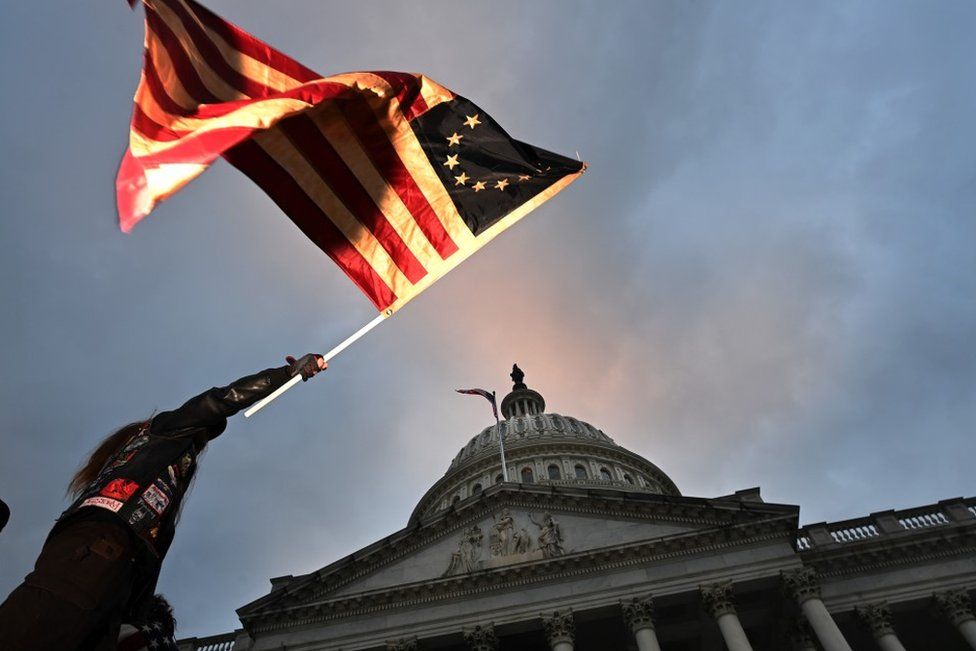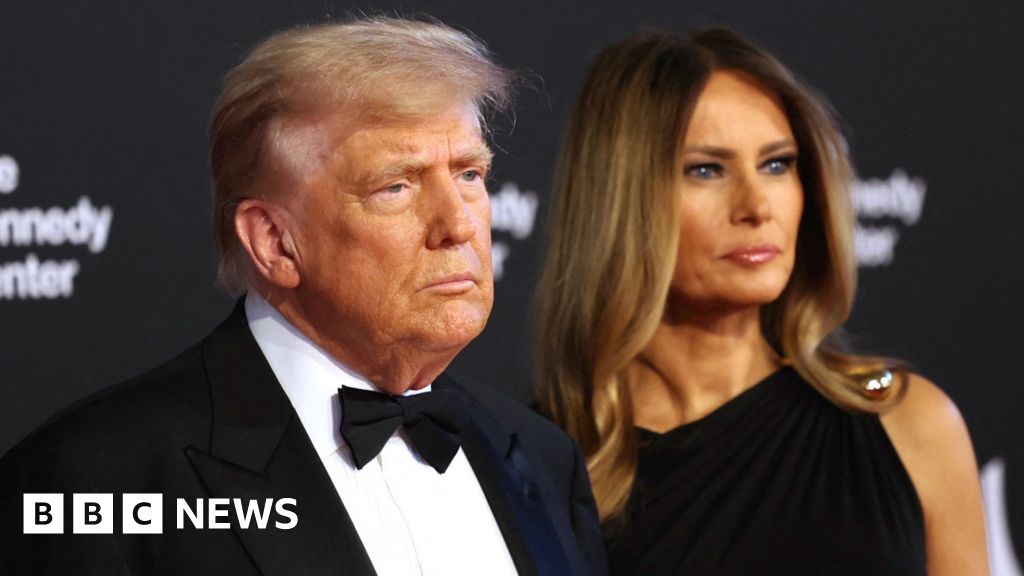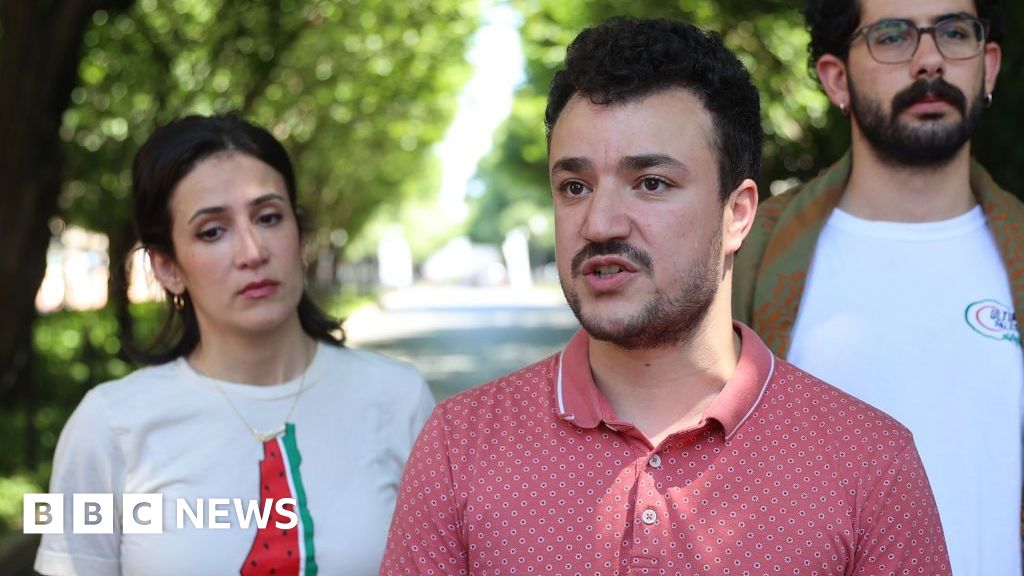ARTICLE AD BOX
 Image source, Getty Images
Image source, Getty Images
By Kayla Epstein
BBC News, New York
Americans watched in horror on 6 January, 2021 as rioters smashed through barricades and ransacked the US Capitol with the goal of stopping the certification of Joe Biden's election.
As Trump supporters stalked the halls of Congress and lawmakers fled to safe rooms in fear, the country seemed united in its disgust.
Yet three years on, the fundamental events of that day, established through eyewitness testimony, thousands of hours of footage, hundreds of indictments and one of the most extensive investigations in federal and congressional history, are no longer agreed upon.
And voters will continue to hear two different interpretations of the attack as the 2024 election gets under way.
The way Donald Trump and Joe Biden talk about 6 January reflects the deep partisan divide that has developed around the riot since it happened.
For Mr Trump and many in his base, the days since have been a tale of nursed grievances and government conspiracy. The former president continues to make the same false allegation that instigated the attack: That the 2020 election was stolen from him.
He has also worked to downplay the Capitol riot's significance and recast the hundreds of supporters convicted of participating in the attack as political prisoners. He has vowed to pardon many if he returns to the White House.
President Biden, meanwhile, plans to emphasise his opponent's involvement in the violent assault on Congress in his first major campaign speech on Friday in Valley Forge, Pennsylvania, a historic site in the American War of Independence.
His intention, according to his campaign, is to use the upcoming anniversary to stress to voters that his predecessor would put US democracy at risk if he wins the election in November.
Image source, Getty Images
"The threat that Donald Trump posed in 2020 to American democracy has grown even more dangerous than it was when President Biden ran last time," Quentin Fulks, Mr Biden's deputy campaign manager, told reporters ahead of the speech.
Mr Biden is banking on there being enough Americans who accept these facts as true.
His re-election hopes hang, in part, on voters also seeing the Capitol riot as a dark chapter of American history and Mr Trump's conduct as disqualifying. That view likely aligns with the Democrats and independents Mr Biden will need to win to keep the White House address for another four years.
A majority of Americans - 55% - believe that 6 January was "an attack on democracy that should never be forgotten", according to a Washington Post/University of Maryland poll released this week. That includes Democrats and independents.
Disinformation sown by Mr Trump and his supporters appears to have resonated with some Americans, however. A quarter of Americans believe a false conspiracy theory that the FBI instigated the attack, the poll suggested.
At the same time, a large majority of Republicans have said it is "time to move on" from 6 January. And only 18% of Republicans believed the attack was violent, which is an eight-point slip from a 2021 survey.
Image source, Getty Images
"It's very tribal, they're very angry about how [Trump has] been treated," David Kochel, a Republican political strategist in Iowa, said of his party's voters.
"People definitely come to his defence, on everything from legal challenges and all those attacks that they perceive from the mainstream media."
It's a new double-edged sword in American politics, political analysts and pundits said. While the topic has galvanised many in Mr Trump's party, memories of the Capitol riot have come back to cut the Republican candidate and kept his allies from major wins at the ballot box.
Focusing on Mr Trump as a threat to democracy helped Democrats deliver a surprisingly successful midterm election in 2022.
"Politicians tend to use what worked for them in the past, and Biden is thinking: 'Once we make Trump the centre of attention again, voters will come back and vote for me, even though I'm quite unpopular,'" Dante Scala, a political science professor at the University of New Hampshire, said.
It is also an angle that has the potential to resonate more emotionally with his voters than boasts about the economy, which have so far fallen flat, one Democrat said.
"To the extent that Biden can clarify that this election is about preserving democracy... it's both beneficial for democracy, and a winning message electorally as well," said Steve Phillips, a Democratic political commentator and host of the "Democracy in Color" podcast.
Image source, Getty Images
Mr Trump, meanwhile, continues to present his own version of events to his voters in social media posts and stump speeches. He has dismissed federal felony charges accusing him of interfering in the 2020 election as a "witch hunt".
He has reframed the rioters as "patriots" and "peaceful people". In a memorable moment, he has even called 6 January a "beautiful day" during a CNN town hall in May.
It appears the former president has almost created a bond between himself and his supporters amid four criminal indictments, saying at one August rally in New Hampshire, "They want to take away my freedom because I will never let them take away your freedom."
"Legally speaking and politically speaking, Trump needed to find a way to tell the story of January 6 in a way that would keep his hold on the base of the Republican Party," Mr Scala said, "and he has largely succeeded."
What do you want to know about the Iowa caucuses and the 2024 US election? Our experts will answer your questions on 15 January.
In some cases your question will be published, displaying your name, age and location as you provide it, unless you state otherwise. Your contact details will never be published. Please ensure you have read our terms & conditions and privacy policy.
Use this form to ask your question:
If you are reading this page and can't see the form you will need to visit the mobile version of the BBC website to submit your question or send them via email to YourQuestions@bbc.co.uk. Please include your name, age and location with any question you send in.

 1 year ago
40
1 year ago
40








 English (US) ·
English (US) ·